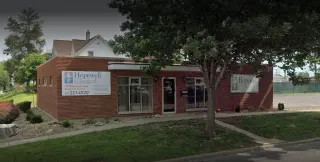



Hopewell Clinical Springfield
Treatment Focus
This center primarily treats substance use disorders, helping you stabilize, create relapse-prevention plans, and connect to compassionate support.
Primary Level of Care
Outpatient treatment offers flexible therapeutic and medical care without the need to stay overnight in a hospital or inpatient facility. Some centers offer intensive outpatient program (IOP), which falls between inpatient care and traditional outpatient service.
This provider hasn't verified their profile's information. Are you the owner of this center? Claim your listing to better manage your presence on Recovery.com.
Treatment Focus
This center primarily treats substance use disorders, helping you stabilize, create relapse-prevention plans, and connect to compassionate support.
Primary Level of Care
Outpatient treatment offers flexible therapeutic and medical care without the need to stay overnight in a hospital or inpatient facility. Some centers offer intensive outpatient program (IOP), which falls between inpatient care and traditional outpatient service.
Private Pay
You pay directly for treatment out of pocket. This approach can offer enhanced privacy and flexibility, without involving insurance. Exact costs vary based on program and length of stay. Contact the center for specific details.
Hopewell Clinical Springfield
Hopewell Clinical Springfield
About Hopewell Clinical Springfield
Hopewell Clinical is a caring outpatient treatment center in Illinois that supports adults and teens who may be working through alcohol or drug use issues, license reinstatement, or court-ordered DUI needs. In an urban environment, situated near a major medical district, the center provides a comfortable, welcoming setting where clients can feel supported. For those who prefer flexibility, Hopewell also offers telehealth sessions, allowing individuals to connect with counselors and group programs from the comfort of their homes.
Begin Healing in a Caring Place
The center provides a variety of services designed to meet people where they are in their recovery. These include DUI evaluations, outpatient and intensive outpatient substance use treatment, and programs for adolescents who need extra support. Clients take part in one-on-one counseling, group therapy, and educational classes that focus on building healthier choices, coping skills, and confidence. Many staff members have personal experience with recovery, helping them understand each client’s journey and provide guidance filled with compassion and respect.
Connect with Support that Cares
Hopewell Clinical continues to support clients by guiding them through the steps of driver's license reinstatement, creating personal relapse prevention plans and referrals to local community resources and peer groups after treatment. They also make care easy to access for everyone in the community by offering telehealth services for counseling and classes. The staff encourages every client to believe in their ability to change and rebuild a healthy, meaningful life. With hope, care, and steady guidance, Hopewell Clinical helps individuals reconnect with their communities and move forward with confidence.
Center Overview
Treatment Focus
This center primarily treats substance use disorders, helping you stabilize, create relapse-prevention plans, and connect to compassionate support.

Pricing and Program Length
Estimated Center Costs
Center pricing can vary based on program and length of stay. Contact the center for more information. Recovery.com strives for price transparency so you can make an informed decision.
Levels of Care






Your Care Options
Specializations
Adolescents
Teens receive the treatment they need for mental health disorders and addiction, with the added support of educational and vocational services.
Drug Addiction
Drug addiction is the excessive and repetitive use of substances, despite harmful consequences to a person's life, health, and relationships.
Alcohol
Using alcohol as a coping mechanism, or drinking excessively throughout the week, signals an alcohol use disorder.
Who We Treat
Men and Women
Men and women attend treatment for addiction in a co-ed setting, going to therapy groups together to share experiences, struggles, and successes.
Adolescents
Teens receive the treatment they need for mental health disorders and addiction, with the added support of educational and vocational services.
Approaches
Personalized Treatment
The specific needs, histories, and conditions of individual patients receive personalized, highly relevant care throughout their recovery journey.
Therapies
1-on-1 Counseling
Patient and therapist meet 1-on-1 to work through difficult emotions and behavioral challenges in a personal, private setting.
Family Therapy
Family therapy addresses group dynamics within a family system, with a focus on improving communication and interrupting unhealthy relationship patterns.
Life Skills
Teaching life skills like cooking, cleaning, clear communication, and even basic math provides a strong foundation for continued recovery.
Online Therapy
Patients can connect with a therapist via videochat, messaging, email, or phone. Remote therapy makes treatment more accessible.
Relapse Prevention Counseling
Relapse prevention counselors teach patients to recognize the signs of relapse and reduce their risk.
Motivational Interviewing
Based on the idea that motivation to change comes from within, providers use a conversational framework to discover personalized methods for change.
Substances We Treat
Drug Addiction
Drug addiction is the excessive and repetitive use of substances, despite harmful consequences to a person's life, health, and relationships.
Alcohol
Using alcohol as a coping mechanism, or drinking excessively throughout the week, signals an alcohol use disorder.
Languages
Aftercare
Intensive Outpatient Program
In an IOP, patients live at home or a sober living, but attend treatment typically 9-15 hours a week. Most programs include talk therapy, support groups, and other methods.
Care Designed for Your Needs
Special Considerations
Smoking and Vaping Policy






